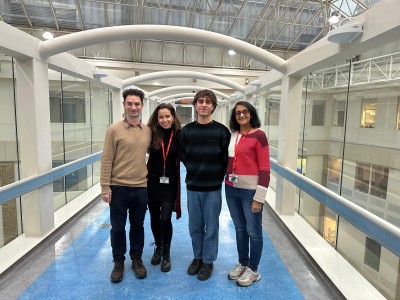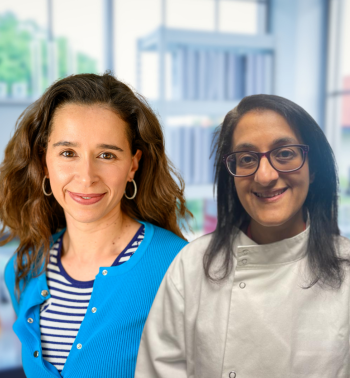22 April 2025
Dr Rocio Martinez Nunez and Dr Varsha Kanabar-Raivadera discuss how funding from the KHP Centre for Translational Medicine is helping the Clinical Diagnostic Development Unit develop its biological sample processing with data extraction, and assay development programme.
Please describe the Clinical Diagnostics Development Unit (CDDU) and its main overall aims?
Dr Varsha Kanabar-Raivadera: The CDDU was developed to provide a harmonised human sample processing. It was formed on the basis of work and knowledge gained during the pandemic – as CDDU members formed part of the King's College London COVID-19 testing programme which gained UKAS accreditation.
The ethos of the unit is to harmonise sample processing, as currently there are a variety of different groups that may be handling blood samples in slightly different ways. The rationale is that using the exact same methodology when conducting smaller studies - particularly when handling blood – forms more robust data sets collectively.
We are disease agnostic. The board members who originally lent their support to the funding application came from various disciplines, believing it was a fantastic opportunity for different specialists to collaborate.
When samples are processed in a standardised way, it means that people can better interrogate biological data from patients, for example those with co-morbidities, as biomarkers that are implicated in specific pathways are highlighted in different diseases. These groups of researchers can come together and interrogate each other's data sets - that's the general ethos.
We’ve also met so many clinicians who perhaps don't have research facilities, laboratory staff, or funding. The trained team within the CDDU can support large clinical trials but also offer our services to provide pilot data, which can then be used for larger funding applications.
Dr Rocio Martinez Nunez: We want to be a resource that people can come to at different stages, regardless of their experience or funding. We can contribute to projects in a variety of ways.
The way we handle these samples means that there's data integrity and data transparency, which I think is really important when you may only see small changes in data sets. You want to know that everything was processed as it should be. Also, we don't want to be a facility where there’s any duplication. We are communicating across core facilities within King's Health Partners (KHP) to ensure that when a user approaches us for some advice, we will find a way to provide end-to-end sample processing and data analysis.
Please tell me about how the funding from the KHP Centre for Translational Medicine is helping the launch of the CDDU and building on your work within the King's College London Faculty of Life Sciences and Medicine?
Dr Rocio Martinez Nunez: The university was generous and gave us all the equipment we needed for the COVID-19 testing programme, while the CTM funding has been essential as it’s paying for the salaries of the staff who currently work in the CDDU. We wouldn't exist without it. We are already busy helping researchers which is really good, in fact we think we will need another pair of hands soon.

Nunez, Mr Luca Colby, Dr Varsha Kanabar-Raivadera
It was always the intention with the unit to provide support to multiple disciplines, as Varsha said, and as the work grows so does the unit. This facilitates enormously the work of the Faculty of Life Sciences and Medicine (FoLSM), because it has always been about exploring translational research from different angles. My interest may be more RNA biology in inflammation and infection, while Varsha is a specialist in cell and tissue biology.
And the leap into truly translating that into something that can be applied in the clinic - may that be a biomarker, a new diagnostic test, or new findings on how certain therapies work – is all benefiting from the CDDU.
How does the CDDU have the potential to benefit patients?
Dr Varsha Kanabar-Raivadera: Everything can benefit the patient directly because we're going to be learning new things about diseases and discovering more about how certain therapies work biologically and their pathways.
Some of our current projects are about biomarker discovery involving the handling of real patient samples. For example, during a year-long study there will be clear clinical data collected over that period. When the samples are processed and analysed at the end, there's data about the patient experience. Whether their disease was stable or if there were flareups, all these things can be easily captured.
The data generated will eventually get published for communities to look at and see how it can benefit guidelines for how therapy and doses are prescribed. These sorts of direct benefits are already happening.
Two key themes for KHP are around personalised health and tackling health inequities. How are these incorporated in the work of the CDDU?
Dr Rocio Martinez Nunez: The inequality that we are prioritising is trying to make translational research more accessible, whether you’re a basic scientist who wants to dip into it or a clinician without a laboratory.
A clear example would be if someone is developing a biomarker to understand response to therapy versus no response - we can help. This has a clear benefit to patients in terms of personalised medicine. Once all the data is collected at the end of a study, we can clearly see that biomarker 123 tells us if the patient is or isn’t responding. Doing this means that you can use this information to make clinical decisions.
In terms of health inequities, we work with barcodes, and that gives a robustness and blindness to the data so it’s completely unbiased.
How does working within King’s Health Partners benefit the CDDU?
Dr Rocio Martinez Nunez: KHP provides an enormous and rich resource of people and knowledge that can do really cool stuff together. We want to be a place where people from different disciplines can come and ask questions, as that helps colleagues to learn and develop. It’s also about connecting with other facilities – if someone needs a specialised methodology, we may not be able to do it, but we know who can.
Dr Varsha Kanabar-Raivadera: Everyone has been so helpful, offering their advice and expertise on how to set the unit up. And all the networks that are available within KHP to help facilitate, to support, to educate, and the various training modules that are available for our staff – it’s been amazing.
If people want to get in touch with us then please do. We’re here to support - everything from a hypothesis that has not been tested, advising on data sets in a particular area, protocols and study design, as well as sample processing. Please do come and chat with us about any translational search work that you need help with.
To learn more about the CDDU visit its website here, or email Dr Varsha Kanabar-Raivadera at varsha.
The Centre for Translational Medicine brings together the organisations of King’s Health Partners and generous funding from the Guy's and St Thomas' Charity to work in partnership to improve the health of people locally, nationally, and globally.
This is through accelerating research and innovation that improves the detection, prevention, and treatment of disease.
The Centre for Translational Medicine aims to:
-
address the major health burdens for local, national, and global communities – and to challenge existing health inequalities;
-
combine our outstanding clinical and scientific expertise to deliver excellent outcomes for patients;
-
develop the next generation of clinical-academic leaders, skilled in delivering impactful translational biomedical research.
For more information about the Centre for Translational Medicine and its funding offers, email: translationalmedicine





